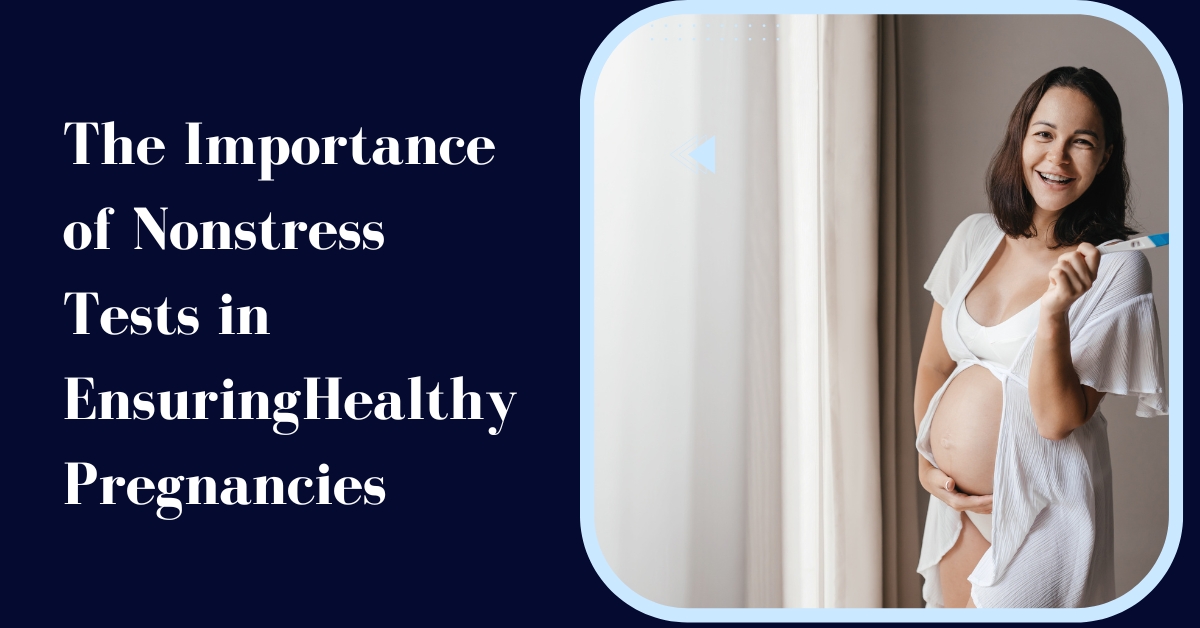Currently Empty: $0.00
The Importance of Nonstress Tests in Ensuring Healthy Pregnancies

Pregnancy is a time of immense joy and anticipation, but it also comes with its share of concerns and uncertainties. Ensuring the health and well-being of both the mother and the baby is paramount throughout this journey. One tool that plays a crucial role in monitoring the baby’s well-being during pregnancy is the Nonstress Test (NST).
Contents
- What is a Non Stress Test (NST)?
- How does a Non Stress Test (NST) device assist during pregnancy?
- Why are NonStress Tests Important?
- 1. Assessment of Fetal Well-Being
- 2. Detection of Fetal Distress
- 3. Risk Management in High-Risk Pregnancies
- 4. Evaluation of Fetal Movement
- 5. Early Detection of Complications
- 6. Reduction of Stillbirth Risk
- 7. Patient Reassurance
- 8. Guidance for Clinical Decision-Making
- 9. Non-Invasive and Low-Risk Procedure
- 10. Assessment of Placental Function
- Conclusion
What is a Non Stress Test (NST)?
A Nonstress Test (NST) is a prenatal test commonly performed during the third trimester of pregnancy. It is a simple, non-invasive procedure that involves monitoring the baby’s heart rate in response to its movements. The test is typically conducted in a hospital or clinic setting and involves placing sensors on the mother’s abdomen to record fetal heart rate patterns.
During an NST, the baby’s heart rate is monitored for a specific period, usually around 20 to 30 minutes. Healthcare providers analyze the baby’s heart rate patterns to assess its well-being and evaluate its response to movement. The goal of an NST is to ensure that the baby is receiving an adequate oxygen supply and is thriving inside the womb.
How does a Non Stress Test (NST) device assist during pregnancy?
1. Assessment of Fetal Heart Rate
The NST device monitors the fetal heart rate, which is crucial for evaluating the well-being of the fetus. A healthy fetus typically exhibits a normal heart rate pattern.
2. Movement Detection
The device also detects fetal movements. Movement is a sign of fetal well-being, and lack of movement could indicate potential problems.
3. Evaluation of Uterine Contractions
In some cases, the NST device may also monitor uterine contractions. This helps in assessing whether contractions are affecting fetal well-being, especially in high-risk pregnancies.
4. Non-Invasive Monitoring
One of the main advantages of the NST is that it’s non-invasive, meaning it doesn’t pose any risk to the mother or the fetus. The device is usually placed on the mother’s abdomen, where it can pick up the fetal heart rate and movements.
5. Timely Detection of Potential Issues
By monitoring the fetal heart rate and movements, the NST device can help in the timely detection of potential issues such as fetal distress or oxygen deprivation. Early detection allows healthcare providers to take necessary actions to ensure the well-being of both the mother and the fetus.
Why are NonStress Tests Important?
Nonstress tests (NSTs) are important because they provide critical information about the health and well-being of a baby during pregnancy. This test monitors the baby’s heart rate and movements, ensuring that the baby is receiving enough oxygen and is developing properly. Regular NSTs can help detect any potential issues early, allowing for timely medical interventions that can prevent complications. For expectant mothers who need frequent monitoring, at home NST test devices offer a convenient and reliable way to keep track of their baby’s health from the comfort of their own home, providing peace of mind and reducing the need for constant hospital visits.
1. Assessment of Fetal Well-Being
NSTs provide valuable insights into the health and viability of the fetus by evaluating its heart rate patterns and movements. A normal NST result indicates that the fetus is receiving adequate oxygen and nutrients from the placenta, essential for its growth and development.
2. Detection of Fetal Distress
One of the primary purposes of NSTs is to identify signs of fetal distress promptly. Changes in the fetal heart rate patterns during the test can indicate potential issues such as hypoxia (oxygen deprivation), placental insufficiency, or umbilical cord compression, prompting further investigation or intervention to prevent adverse outcomes.
3. Risk Management in High-Risk Pregnancies
Women with certain medical conditions, such as gestational diabetes, hypertension, or a history of pregnancy complications, are considered at higher risk for fetal complications. NSTs play a crucial role in monitoring these pregnancies more closely, allowing healthcare providers to intervene promptly if any abnormalities are detected.
4. Evaluation of Fetal Movement
In addition to monitoring fetal heart rate, NSTs also assess fetal movements. A lack of fetal movements during the test may indicate fetal sleep or potential problems with the central nervous system. Observing adequate fetal movements reassures healthcare providers and expectant parents of the fetus’s well-being.
5. Early Detection of Complications
Early detection of fetal abnormalities or complications through NSTs allows healthcare providers to implement appropriate management strategies promptly, potentially improving outcomes for both the mother and the baby.
6. Reduction of Stillbirth Risk
Regular NSTs have been associated with a reduced risk of stillbirth in non stress devices high-risk pregnancies. Early detection of fetal distress or complications through NSTs allows for timely intervention, potentially preventing adverse outcomes such as stillbirth.
7. Patient Reassurance
For expectant parents, NSTs offer reassurance about the well-being of their unborn child. Seeing normal NST results can alleviate anxiety and foster a sense of confidence in the pregnancy’s progress.
8. Guidance for Clinical Decision-Making
The results of NSTs guide clinical decision-making regarding the timing of delivery or the need for additional fetal monitoring or interventions. This proactive approach helps optimize maternal and fetal outcomes.
9. Non-Invasive and Low-Risk Procedure
NSTs are non-invasive and pose minimal risk to both the mother and the fetus. They are typically performed in outpatient settings without the need for anesthesia or invasive procedures, making them a safe monitoring option during pregnancy.
10. Assessment of Placental Function
NSTs indirectly evaluate the function of the placenta, which is vital for supplying oxygen and nutrients to the fetus. Abnormalities in the NST results can signal issues with placental function, such as placental insufficiency, which may require further investigation and management.
Conclusion
Nonstress Tests (NSTs) are invaluable tools in ensuring the health and well-being of both mother and baby during pregnancy. By monitoring fetal heart rate patterns and assessing the baby’s response to movement, Nonstress Tests (NSTs) provide critical information that guides clinical decision-making and promotes timely intervention when necessary.
Incorporating Nonstress Tests (NSTs) into routine prenatal care helps detect potential issues early, reduce the risk of complications, and ultimately contribute to healthier pregnancies and safer deliveries. As expectant parents, embracing nonstress tests (NSTs) as part of the pregnancy journey offers reassurance and peace of mind, knowing that their baby’s health is being closely monitored every step of the way.













